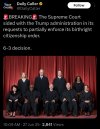No ID, no service. That’s the new reality for porn sites in Texas after the Supreme Court upheld a state law requiring age verification to access such sites on Friday.
The 6-3 decision is a major change in First Amendment law as applied to the internet and will likely lead more states to enact similar age verification requirements across the country. Porn sites that do not wish to comply will likely entirely block access in states with age verification laws, as PornHub, the largest online pornography site, did in Texas after the 5th U.S. Circuit Court of Appeals upheld the law in 2024.
Justice Clarence Thomas wrote for the majority, with the court’s three liberal justices dissenting.
This is the first time the Supreme Court has approved a significant restriction on access to online pornography. Previously, in two separate decisions, the court struck down the restrictions imposed in the Communications Decency Act of 1996 and the Child Online Protection Act of 1998 as unconstitutionally restricting free speech. Those laws, however, swept far more broadly than Texas’ anti-porn law, seeking to restrict access to materials that either included writing or were not pornographic in nature.
Additionally, Thomas notes that technology has advanced since the court’s rulings on those laws enacted in the 1990s.
“With the rise of the smartphone and instant streaming, many adolescents can now access vast libraries of video content—both benign and obscene—at almost any time and place, with an ease that would have been unimaginable at the time” the court last ruled on online pornography, Thomas wrote.
At issue is the 2023 Texas law HB 1181, which seeks to limit minors’ access to porn sites by requiring everyone to provide age verification — meaning proof of identity — in order to access such sites.
A district court judge applied strict scrutiny to rule that the law was likely unconstitutional in 2023, but the 5th Circuit appeals court chose to apply a lower level of scrutiny, rational basis, which requires the government to show that there is a rational connection between the law and a legitimate state interest, to uphold the law.
The Supreme Court upheld the 5th Circuit’s decision to use rational-basis scrutiny, marking a significant change in how it would review First Amendment challenges related to online pornography.
“The statute advances the State’s important interest in shielding children from sexually explicit content,” Thomas wrote for the majority. “And, it is appropriately tailored because it permits users to verify their ages through the established methods of providing government-issued identification and sharing transactional data.”
The law, which had remained in effect during the appeal to the court, will now remain in effect. It places onerous fines, of $10,000 per day and $250,000 if a site is found to have allowed a minor to gain access, on sites that allow minor access by failing to verify users’ age. But the law exempts search engines, social media sites and service providers.
Lawyers for the Free Speech Coalition, a consortium of porn sites, acknowledged that states may restrict access to pornography for minors, but argued that the law placed an undue burden on the speech of adults by requiring them to undergo age verification.
But Thomas rejected this, arguing that the First Amendment does not protect against age verification.
“[A]dults have no First Amendment right to avoid age verification, and the statute can readily be understood as an effort to restrict minors’ access,” Thomas wrote. “Any burden experienced by adults is therefore only incidental to the statute’s regulation of activity that is not protected by the First Amendment.”
The 5th Circuit was therefore correct in using a lower level of scrutiny when judging the law, Thomas argued. Had the court applied strict scrutiny, other uses of age verification, including for “brick-and-mortar stores,” may be called into question.
While states certainly have a right and justification to restrict minors from accessing pornography, courts have applied strict scrutiny in all past such cases to determine if laws that aim to do so also burden adults, Justice Elena Kagan wrote in dissent.
“Under ordinary First Amendment doctrine, this Court should subject H. B. 1181 to strict scrutiny,” Kagan wrote. “That is because H. B. 1181 covers speech constitutionally protected for adults; impedes adults’ ability to view that speech; and imposes that burden based on the speech’s content. Case closed.”
Since the Texas law in question requires adults to verify their age by providing a driver’s license or data “associated with things like a job or mortgage,” it acts as “a deterrent” for adults looking to access pornography, according to Kagan.
“It is not, contra the majority, like having to flash ID to enter a club,” Kagan wrote. “It is turning over information about yourself and your viewing habits—respecting speech many find repulsive—to a website operator, and then to ... who knows? The operator might sell the information; the operator might be hacked or subpoenaed.”
Thomas, however, rejected these concerns as merely placing “lesser burdens” on adults that do not trigger strict scrutiny.
Eighteen states, including Texas, have laws in effect that require age verification for pornography sites. Another six states have enacted such laws that are not yet in effect.




















































